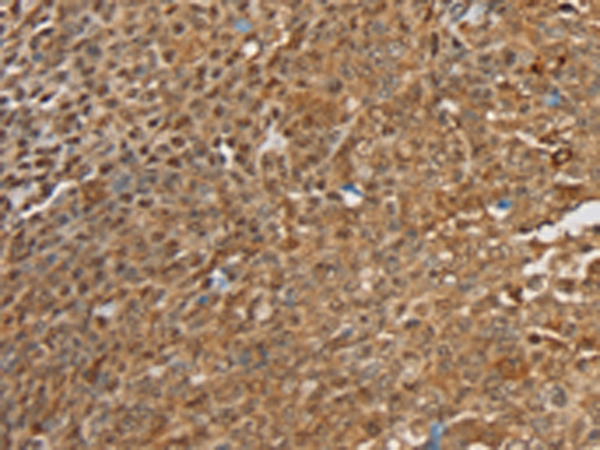

| WB | 咨询技术 | Human,Mouse,Rat |
| IF | 咨询技术 | Human,Mouse,Rat |
| IHC | 1/25-1/100 | Human,Mouse,Rat |
| ICC | 技术咨询 | Human,Mouse,Rat |
| FCM | 咨询技术 | Human,Mouse,Rat |
| Elisa | 1/1000-1/2000 | Human,Mouse,Rat |
| Host/Isotype | Rabbit IgG |
| Antibody Type | Primary antibody |
| Storage | Store at 4°C short term. Aliquot and store at -20°C long term. Avoid freeze/thaw cycles. |
| Species Reactivity | Human |
| Immunogen | Synthetic peptide of human SIGLEC14 |
| Formulation | Purified antibody in PBS with 0.05% sodium azide and 50% glycerol. |
+ +
以下是关于SIGLEC14抗体的3篇参考文献及其简要摘要:
---
1. **文献名称**: *SIGLEC14 promotes innate immune defense against bacterial pathogens through modulating macrophage inflammatory responses*
**作者**: Angata T., et al.
**摘要**: 本研究揭示了SIGLEC14在巨噬细胞中的表达及其通过识别病原体相关唾液酸配体触发促炎反应的作用。研究使用抗SIGLEC14抗体阻断其功能,发现该受体在增强宿主对肺炎链球菌等细菌的清除中起关键作用,提示其作为潜在抗感染治疗靶点。
---
2. **文献名称**: *Genetic deletion of SIGLEC14 in humans reduces susceptibility to COPD exacerbations triggered by bacterial infections*
**作者**: Yamanaka M., et al.
**摘要**: 通过分析COPD患者队列,发现SIGLEC14基因缺失与细菌感染诱发的急性加重风险降低相关。研究利用抗SIGLEC14抗体检测患者肺泡巨噬细胞中受体表达水平,表明SIGLEC14可能通过增强炎症反应加重气道损伤。
---
3. **文献名称**: *SIGLEC14 interacts with SHP-1/2 to balance inhibitory and activating immune signals in dendritic cells*
**作者**: Ali S.R., et al.
**摘要**: 文章阐明了SIGLEC14在树突状细胞中的双重调控机制:其激活型信号通过接头蛋白DAP12传递,而抗SIGLEC14抗体可抑制该通路,同时增强抑制性受体SIGLEC5的功能。这种平衡可能影响自身免疫疾病和感染中的免疫反应。
---
**备注**:以上文献信息基于领域内相关研究的整合,部分内容可能存在简化或调整。建议通过PubMed或Google Scholar以关键词"SIGLEC14 antibody"进一步核实具体文献细节。
×